Graham Reid | | 8 min read
N-Shift (from the album K-Scope, 1978)

Guitarist Phil Manzanera remembers very
clearly how and when he first met the band that would give him his
career, Roxy Music.
“Yes, I failed the audition,” he
says about that day in '71when he went to a house in Battersea and
plugged in his Gibson ES-325 (“unfashionable for Roxy Music”) to
play alongside singer Bryan Ferry, knob and tape twiddler Brian Eno,
saxophonist Andy MacKay, drummer Paul Thompson and the band's
original bassist Graham Simpson.
“I had an absolutely streaming cold
and I'd read about Roxy, they'd sent a demo in to Melody Maker and
the band I was in, Quiet Sun, had done that too. I was playing
jazz-rock sort of stuff with funny time signatures and I go this tiny
little room and they said, 'Let's have a jam'.”
So far so obvious. But given Roxy
Music's glamorous implosion of 50s rock'n'roll, oddball sonic
squiggles from Eno and post-modern whatever-fits sound of their
self-titled debut album of 72 it's hard to imagine what you might
have to play at an audition.
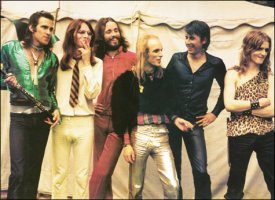 “It was two chords from a Carole King
number and I'm thinking 'Two chords? I've just been playing eight
bars in 7/15 time or whatever' and I thought, 'Freedom! This is
wonderful, I didn't need to count time signatures I could just blast
away and do mad things'.
“It was two chords from a Carole King
number and I'm thinking 'Two chords? I've just been playing eight
bars in 7/15 time or whatever' and I thought, 'Freedom! This is
wonderful, I didn't need to count time signatures I could just blast
away and do mad things'.
“And that is probably why I failed
the audition,” he laughs.
Manzanera – the son of an English
father and a Columbian mother, and who grew up in various parts of
South America and Cuba – was miserable at being rejected, kept
bumping into the band at concerts and got to know them, acted as
their roadie for a bit and got then got the call-up before Roxy
Music' astonishing debut album.
Some years younger than most other
members he was initially in awe but something about Roxy Music set
them apart: “When I first met them they were very grown up – five
years older – they had been to university, had bank accounts and
were renting a house. This was grown-up stuff. But there was
something about them I wanted to be a part of.”
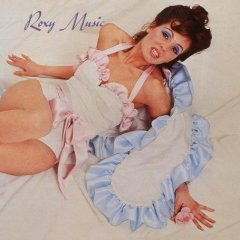 Roxy Music were very special. Their
first three albums in glamorous gatefold covers – sultry models on
the outside, the band posing in retro-spacerock clothes on the inside
– brought a sense of glam-retro and art-school cool into play.
Roxy Music were very special. Their
first three albums in glamorous gatefold covers – sultry models on
the outside, the band posing in retro-spacerock clothes on the inside
– brought a sense of glam-retro and art-school cool into play.
And, as Manzanera admits, dressing up
gave them confidence on stage for what they were unleashing. He
remembers discussing films with Ferry at that audition and realising
the band wanted to present their music in a visual away. A someone
who had been in the film society at school he was immediately
attracted.
“And they all had friends who were
starting out as fashion designers, photographers, art directors, all
in their mid 20s. They were people who wanted to be the next
generation in that gap after David Bowie.
“He kindly asked us to support him
playing to about 100 people in pubs in Croydon. We suddenly felt we
were part of something.”
And set apart also: Roxy Music avoided
singles, presented their albums and shows like art concepts, Ferry
famously fired Eno (or he quit) after two albums for being a
“non-musician” which he took as a compliment, various bassists
passed through and by the mid Seventies they were a dominant force in
music and fashion.
With Ferry garnering so much attention
it was inevitable he would record solo albums – as did Manzanera
and MacKay – and they broke up in 76.
And in the late Seventies as punk and
New Wave were getting a foothold a highly favourable Rolling Stone
review of a Manzanera solo album called him “the world's last
psychedelic guitarist”.
He laugh again: “Yes, that would
apply, that's a lot of my background. Someone said in a recent review
my guitar sounded very feral, which I thought was great. Just mad.”
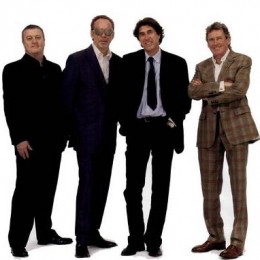 Roxy Music reformed around the same
time as that Stone review, but the sound of the albums – Manifesto,
Flesh + Blood and Avalon -- was cooler, more
pop-orientated and with a glassy production sheen. They split again
in 83 – Ferry into a successful solo career, Manzanera making solo
albums and doing production work – and then against the odds
reformed in 2001, again in 2005 when there were hints of a new album,
and now they are on the road again.
Roxy Music reformed around the same
time as that Stone review, but the sound of the albums – Manifesto,
Flesh + Blood and Avalon -- was cooler, more
pop-orientated and with a glassy production sheen. They split again
in 83 – Ferry into a successful solo career, Manzanera making solo
albums and doing production work – and then against the odds
reformed in 2001, again in 2005 when there were hints of a new album,
and now they are on the road again.
It seems fair to ask, given all have
successful careers outside of Roxy what the attraction is to keep
getting back together.
“The reason I got into music,” says
Manzanera “was I always envied families with lots of kids and when
I was nine or ten it was 'please send me to boarding school'. I just
want to be with people and I formed a band at at school and it was
the social side I enjoyed as well as the musical conversations with
people.
“With Roxy it's the songs. It does
all come back to music every time, whatever grievance or
disagreements you might have about anything, it gets you the minute
you start playing some of those songs like In Every Dream Home a
Heartache, Remake/Remodel or something from the latter period.
“You think, 'Actually this has a
world and life of its own and its very nice to play. And it's ours,
if we don't play it no one will ever hear it again. There was no Roxy
Music covers band so if we don't play these songs . . .”
These days Roxy Music are cited as
influences by bands as diverse as the Scissor Sisters and Arcade Fire
– with whom Roxy have played at festivals, them on a A stage, Roxy
on the B – although Manzanera says he can't hear any direct musical
connections.
“They are very generous when they say
that and they probably did listen to Roxy but whether it has come out
in their music I don't know, I doubt it. I wonder if its good to say
you like Roxy? That would be fantastic.”
Manzanera holds great affection for New
Zealand and some of its musicians in particular. He recalls a tour to
Australia in the mid Seventies and seeing Split Enz on television in
his hotel room. That night, to his surprise and delight, the Enz
opened for Roxy Music and he watched them from the side of the stage.
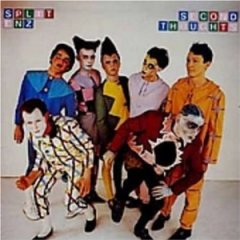 “After they came off I went back to
their dressing room and said, 'You guys are mad and brilliant, if
there is anything I can do to help . . .' Then later they rang and
said they were doing their first album but would I produce them in
the future, and as it turned out they ended up coming to England and
we re-recorded a lot of the first album Mental Notes.
“After they came off I went back to
their dressing room and said, 'You guys are mad and brilliant, if
there is anything I can do to help . . .' Then later they rang and
said they were doing their first album but would I produce them in
the future, and as it turned out they ended up coming to England and
we re-recorded a lot of the first album Mental Notes.
That album appeared as the Enz' Second
Thoughts album of '76 which became their debut in Britain.
“It is amazing how many people
remember them with affection. At that time Neil Finn was too young to
be in the band and at one point he came over and they said 'Can you
show him a few things on the guitar'. Which is embarrassing to say
now that he is such and an amazing musician and songwriter. They
played on my solo album and the money from that got them back to New
Zealand and then they rose from the ashes.”
Although separated by years and
distance, there are parallels between Roxy Music and Split Enz: both
brought a sense of theatre to the stage, made complex music, and both
enjoyed two quite distinct phases, the early dress-up period and the
later pop-conscious albums.
Various Enzmen played on Manzanera solo
albums down the years (he has made almost 30) as well as recently
writing and co-producing On an Island and Live in Gdansk for Pink
Floyd's David Gilmour.
As to that mooted Roxy Music album of
05 with Eno briefly back in the ranks?
Some tracks ended up on a Ferry album
(“I haven't heard it, I'm told it's good – I've written a track
on it apparently”) but most of the material was unfinished and
everyone moved on to other things.
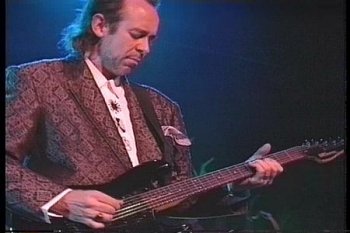 “But very few band of our age have
got together and done albums that are considered to be one of their
best. It's quite daunting task. I've produced over 60 albums so I
know what a fantastic song is. If you do something and think 'It's
pretty good'. But is it amazing? The answer is no.
“But very few band of our age have
got together and done albums that are considered to be one of their
best. It's quite daunting task. I've produced over 60 albums so I
know what a fantastic song is. If you do something and think 'It's
pretty good'. But is it amazing? The answer is no.
“Do you keep on doing it or not?
There is no paradigm for people when you get to this age.”
Touring these days, while comfortable,
means they are in front of audiences who barely know their music
(“and are younger than my children”) which means they have to try
that bit harder to get attention
“You try to win over an audience and
it's good for you. You are putting yourself and the music on the
line.
“And we've got a great visual show
using all the iconography of the last 40 years. It's wonderful to
look at some of the screen with those beautiful women appearing. I
can't help it.”

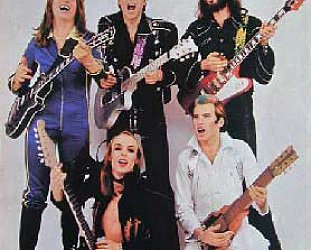
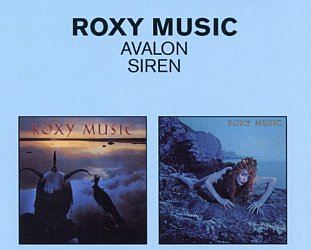

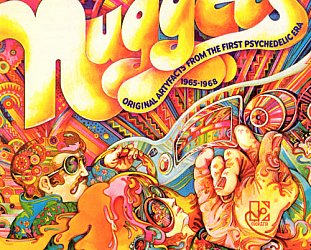
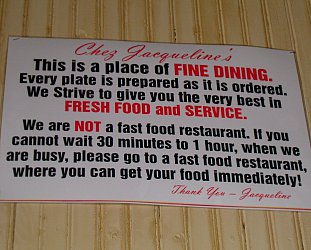
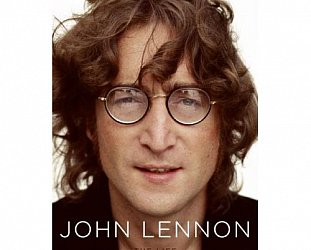
post a comment